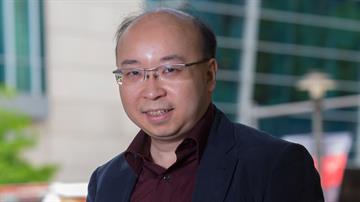 On Dec. 9, the Hong Kong Legislative Council will resume its second reading debate on the Copyright (Amendment) Bill 2014. Among the legislative amendments to be introduced are those Professor Peter Yu of Texas A&M University School of Law has helped develop. Yu, a native of Hong Kong, co-directs the school’s Center for Law and Intellectual Property.
On Dec. 9, the Hong Kong Legislative Council will resume its second reading debate on the Copyright (Amendment) Bill 2014. Among the legislative amendments to be introduced are those Professor Peter Yu of Texas A&M University School of Law has helped develop. Yu, a native of Hong Kong, co-directs the school’s Center for Law and Intellectual Property.
Yu first delivered his proposal in a public lecture at the University of Hong Kong (HKU) in Aug. 2013, shortly after the Hong Kong government launched a new consultation on digital copyright reform.
Later that year, he worked closely with the HKU Journalism and Media Studies Centre to prepare a submission to the Hong Kong government. The submission called for the creation of a mandatory exception for predominantly non-commercial user-generated content and, in the alternative, a fair dealing exception for such content.
His proposal has since received considerable support from local internet user groups and members of the public, as well as a select group of legislators in Hong Kong. His research and publications, in both Chinese and English, have also been cited in government reports, introduced into the legislative record and repeatedly mentioned during the legislative debates within both the Bills Committee and the Panel on Commerce and Industry.
In July 2014, at the invitation of a local legislator, he returned to Hong Kong to give a public seminar at the Legislative Council, analyzing the strengths and weaknesses of the proposed copyright amendment bill. In the more than two years since advancing his proposal, he has shared his views with government officials, copyright owners, industry representatives and Internet user groups.
"I am excited that Hong Kong legislators are interested in this proposal, and I am also very grateful to the local Internet user community, whose members have championed this proposal. With the Internet and social media, individual users can now actively participate in the creative process,” he said.
“The key debate in today's copyright law is no longer solely about how we can provide adequate protection to copyright owners, but also about how we can strike an appropriate balance among the many competing interests of authors, copyright owners, technology developers and Internet users,” said Yu.
Citing reluctance on the part of many legislators and the Hong Kong government to adopt legislation that has not yet been adopted in many parts of the world, Yu said he believes the proposal has a long way to go before being adopted into law. Nevertheless, Yu indicated he is pleased that Hong Kong legislators are willing to consider new ideas that will enable the copyright system to better adapt to changing social, economic and technological conditions.
In the meantime, Yu said he is particularly pleased that his students were able to work on some of the documents or publications that have now been cited by Hong Kong policymakers and legislators.
"For students interested in learning more about copyright law reform, there is no better way to do so than to actively participate in the reform process,” Yu said. "If students are to succeed in the legal profession, they will need to learn both theory and practice."
The Center for Law and Intellectual Property (CLIP), which Yu and Professor Megan Carpenter co-direct, offers a specially designed curriculum that balances practice with theory. CLIP features a concentration in intellectual property and a wide array of basic courses and advanced seminars. Students specializing in intellectual property can also gain practical experience through the Entrepreneurship Law Clinic and the Intellectual Property and Technology Law Clinic, which consists of patent and trademark clinics certified by the U.S. Patent and Trademark Office.